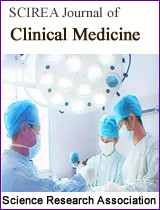Analysis of the influence factors of thrombolytic therapy of urokinase in patients with acute cerebral infarction
DOI: 225 Downloads 14711 Views
Author(s)
Abstract
Objectiv:To analysis of the influence factors of thrombolytic therapy of urokinase in patients with acute cerebral infarction in order to predictive the thrombolytic therapy.Methods:From January 2012 to June 2016, 129 patients with acute cerebral infarction treated with intravenous urokinase thrombolysis therapy were divided into effective group and ineffective group according to the effect of thrombolytic therapy.The factors of age, sex, smoking, drinking, diabetes, hypertension, stroke history, onset to treatment time, door to needle time, urokinase dose,baseline NIHSS score,baseline MAP , baseline LDL-C level , atrial fibrillation and arterial stenosis or occlusion were compared between the two groups.Result:Univariate analysis showed that the time of onset to thrombolysis was significantly shorter in the effective group , and the proportion of hypertension history, diabetes history and the proportion of arterial stenosis or occlusion was significantly lower in the effective group than in the ineffective group.Conclusion:The effect of urokinase thrombolytic therapy was poor in the acute cerebral infarction patient with longer onset to treatment time,diabetes history and arterial stenosis or occlusion.
Keywords
acute cerebral infarction,urokinase,intravenous thrombolysis,treatment effect, influence factors
Cite this paper
NONG Yuan, XIAO Hai, CHEN Kui, ZHANG Tai-peng, LI Xiu-fen,
Analysis of the influence factors of thrombolytic therapy of urokinase in patients with acute cerebral infarction
, SCIREA Journal of Clinical Medicine.
Volume 4, Issue 6, December 2019 | PP. 230-238.
References
| [ 1 ] | Jauch EC,Saver JL,Adams HJ,et la.Guidelines for the early management of patients with acute ischemic stroke:a guideline for healthcare professionals from the American Heart Association/American Stroke Association[J].Stroke,2013,44(3):870-947. |
| [ 2 ] | 沈 芳,刘康永,孙晓江. 急性缺血性脑卒中血管内治疗进展[J].中国临床神经科学,2015,23(3):331-337. |
| [ 3 ] | 国家“九五”攻关课题协作组.急性脑梗死六小时以内的静脉溶栓治疗[J].中华神经科杂志,2002,35(4):210-213. |
| [ 4 ] | 鲍旭,尿激酶及阿替普酶治疗急性脑梗死疗效及安全性的比较研究[J].中国现代药物应用,2015,9(18):103-104. |
| [ 5 ] | 莫才周, 董自庆,邹细妹.UK与 rt-PA 在急性脑梗死患者中的应用价值[J].中国实用神经疾病杂志,2015,18(16):20-22. |
| [ 6 ] | 刘丽萍,王伊龙,郑华光,等 . 2009 美国国际卒中会议纪要[ J ] . 中国卒中杂志, 2009 , 4 ( 4 ): 267-272. |
| [ 7 ] | Emberson J,Lees KR,Lyden P,et al. Effect of treatment delay,age,and stroke severity on the effects of intravenous thrombolysis with alteplase for acute ischaemic stroke:a meta-analysis of individual patient data from randomised trials[J]. Lancet,2014,384(9958):1929-1935. |
| [ 8 ] | 赵立伟,赵艳凤,周丹等.急性脑梗死在不同时间窗溶栓治疗的效果评价[J].中国继续医学教育,2015,7(5):92-93. |
| [ 9 ] | 孙 丽 ,陈 敬 ,贾春红,等.rt-PA 溶栓治疗急性缺血性脑卒中临床效果及影响因素分析[J].临床军医杂志,2017,45(2):133-135. |
| [ 10 ] | 王梅.进展性脑梗死临床病因分析[J].心血管病防治知识,2017,4(1):3-5. |
| [ 11 ] | 陆婉杏,李保生, 蓝景生. 老年急性后循环进展性脑梗死的相关危险因素分析[J].中国医药指南,2017,15(12):52-53. |
| [ 12 ] | 张芳芳 ,吕壮伟.进展性脑梗死的相关危险因素分析[J].中国实用神经疾病杂志,2016,19(10):86-87. |
| [ 13 ] | 邓欣莲.2型糖尿病合并急性脑梗死患者血糖水平及血糖漂移对神经功能缺损的影响[J].临床与病理杂志,2016,36(5):647-651. |
| [ 14 ] | 马艳霞, 吕肖锋, 焦秀敏, 等. 2型糖尿病合并急性脑梗死患者血糖波动与溶栓预后的关系[J]. 中国脑血管病杂志, 2014,8(18):415-419. |
| [ 15 ] | Sharma VK, Tsivgoulis G, Tan JH, et la. Feasibility and safty of intravenous thrombolysis in multiethnic Asian stroke patients in Singapore[J]. J Stroke Cerebrovasc Dis.2010;19(6):424-430 |
| [ 16 ] | Lau AY, Wong EH, Leung TW, et al. Intravenous alteplase for Chinese patients with stroke and borderline eligibility[J]. J Clin Neurosci. 2012;19(10):1383–1386. |
| [ 17 ] | Xu ZP,Li HH,Li YH,et la.Feasibility and outcome of intravenous thrombolysis 3-4.5 hours after stroke in Chinese patients[J]. J Clin Neurosci.2014;21(5):822-826. |
| [ 18 ] | Miao ZR,Jiang LD,Wu H,et la.Ramdomized controlled trial of symptomatic middle cerebral artery stenosis:endovascular versus medical therapy in a Chinese population[J].Stroke,2012,43(12):3284-3290. |
| [ 19 ] | Jiang WJ,Yu WG,Du B,et la. Outcome of patients with>70% symptomatic intracranial stenosis after Wingspan stenting[J].Stroke,2011, 42(7):1971-1975. |

